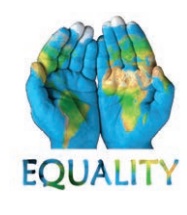Political Science - What do you mean by Social Justice? | 11th Political Science : Chapter 12 : Social Justice
Chapter: 11th Political Science : Chapter 12 : Social Justice
What do you mean by Social Justice?
What do you mean by Social Justice?
The negative values which are made by the society
results in inequality and cleavation among people. Gender inequality may be
quite natural, if looked upon superficially. All along the centuries, women
were subjugated and exploited without an opportunity which portrays them as
weaker section. The negative attitude against blacks of Africa belongs to same
category which is mentioned in the previous lines. Blacks were discouraged and
kept aside as knowledge less. This situation continued for many centuries and
factualised against the black community. Same situation prevails also in India.
Many people were refused opportunities on the basis of caste and it is believed
as natural one in the society. Every action and reaction is fudged one in our
country. Power as a demon spread its tentacles in all the sphere of the
society, as stated by so many experts and exponents. Social power is the
dominant phenomenon which leads to cut-throat competition and ends in absolute
control of the subjects. It is in order to protect the social identity, the
dominant communities endeavor to capture the power sector. Among different
communities in a plural society, dominance of a single group is considered as
unfair and unjust. The dominant groups activate racial, religious, caste,
lingual and cultural feelings and intend to misuse the social rights of other
groups that may end in permanent hostility between different groups. The
struggle that is undertaken by the weaker groups in order to react for
establishing equal society is known to be Social Justice.
Background of Social Hierarchy
The ancient Indian civilization had evolved with
the “Varnashrama Dharma” which kick-started the principle of hierarchy i.e.
Upper and Lower strata. The Varna system is also called as “Four Varna System”
by which people were divided as Brahmins, Kshatriyas, Vysyas and Shudras.

This division on the basis of birth has been
inculcated and socialized along different phases of civilization from which inequalities surfaced in the society.
Race, religion and lingual minorities UN proclamation – December 18, 1992.
Salient Features
1.
All minorities are having equal right
without any discrimination and intervention to exercise their freedom in
following hereditary values, to cling with religion, to propagate and to use
their language.
2.
All minorities can make their own
organization and are having every right to maintain it.
3.
Minorities should have right to
upgrade their knowledge related with their history, conventions, language and
other hereditary values. They should also be provided with opportunity to learn
about entire society to which they belong to.
4.
This declaration may not affect the
basic freedom which is stipulated in the existing rights declaration.
Article 15 (4) of Indian Constitution
Article 29 (2) may not act as an obstacle in making
special policy decisions for socially and educationally backward communities or
SC/ST people.
Article 16 (4) of Indian Constitution
This will not prevent any sort of appointment or
reservation among backward communities, if sufficient representation is not
provided. India is a sub-tropical, sub-continent with varied geographical
atmosphere. People speak different languages and follow unique hereditary
values. Albeit of these factors, inequality is existing due to the Varna
System. It is in order to advance and develop the socio-economic conditions of
the downtrodden communities; Indian Constitution is having its ideal guidelines
with strong structural foundation.
According to Indian Constitution, States which are
having low technological development or inadequate natural resources can make
their own special policies for holistic advancement. In accordance with the
existing constitutional provisions, the downtrodden and underprivileged
communities were provided with special laws and privileges in all the states.
Ideas like all inclusive development and
self-sufficient societal growth highly hinges upon social justice along with
special arrangements for the marginalized sections. Equal opportunity is the
process and social arrangement by which social democracy can sustain and
pluralism will be strengthened. In such a society different groups of religion,
race and other factors can live with their social identity, tolerance and
shared power.
Economic condition and status is one among the
reason for the wedge created in the European society. Whereas in India, the
division is on the basis of purusasvktha of Rigveda and particularly Four Varna
System.
This Varna System prevents individuals from their
exercise of rights and values. Indian Constitution in this regard is
implementing all its supervisory mechanisms and also is delivering distributive
justice which is the motto of the largest democracy. This justice intended to
weed out the caste distinction (Varna System) and to establish equal society in
India.
The democratic values in Indian Constitution
protects and delegate power to all the people equally to develop themselves in
the socio-economic sectors. Sticking on with this constitutional provisions may
lead to social development and further give place for social freedom and
justice. Hence, vibrant social justice in India protects National Integration
from which distributive justice and democratic values are concretized.
Related Topics